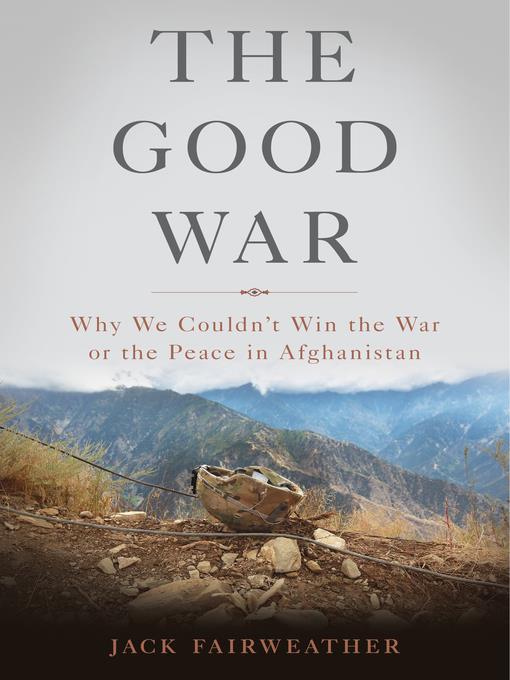
The Good War
Why We Couldn't Win the War or the Peace in Afghanistan
- اطلاعات
- نقد و بررسی
- دیدگاه کاربران
نقد و بررسی

September 29, 2014
Unrealistic expectations, inadequate local knowledge, and poor planning doomed the post-2001 allied effort in Afghanistan, argues Fairweather (A War of Choice), a Middle East editor and correspondent for Bloomberg News, who spent time embedded with British forces. Prior to deploying to the area around Kandahar, Fairweather says, “British understanding of the situation didn’t extend much further than... vague misgivings and self-assurances,” and Americans were hardly better off. Fairweather’s richly-narrated history of the conflict is a soft-spoken but scathing indictment of military tactics and lack of preparation. His story takes frequent tragicomic turns, as when a much-heralded Taliban interlocutor presented to Hamid Karzai as a negotiating partner turned out to be a shopkeeper with no connection to terrorists. When the British military’s request for funds for additional helicopters was rejected, they purchased them anyway, “using an accounting sleight of hand” that was immediately detected by then-chancellor Gordon Brown. Now, with the war winding down, Afghanistan is left with a badly fractured political system and a government unable to secure large areas of the country. Fairweather’s central point is that hubris and arrogance led the U.S. military into dangerous territory abroad as well as domestically: “By pushing civilian leadership into escalating the war, the military had strayed into unprecedented—and unconstitutional—political waters.” Maps & b&w photos.

October 1, 2014
A reconsideration of "how the world's most powerful leaders plotted to build a new kind of nation in Afghanistan that was pure fantasy." Bloomberg News Middle East editor and correspondent Fairweather (War of Choice: The British in Iraq 2003-9, 2011) finds American naivete and confusion of purpose at the crux of what went wrong in the war in Afghanistan. The original defeat of the Taliban in 2001 was almost too swift to be true, and early on, President George W. Bush insisted that the United States was "not into nation-building; we are focused on justice." Then, the U.S. shifted the focus to Iraq, allowing the Afghan warlords to duke it out, especially the opportunistic, CIA-backed Hamid Karzai. As the Taliban began to creep back in and the provinces fell into anarchy and opium-growing (once quelled under the austere Taliban), the American administration underwent a philosophical shift. With Iraq then in tatters, a humanitarian aim of rebuilding the country took over. Yet corruption skimmed the aid money, and U.S. engineering firms had little knowledge of the local environment, and there was virtually no oversight. The creation of a series of Provincial Reconstruction Teams was an attempt to tie local tribal connections to a central authority, and some of Karzai's appointed governors were removed-Helmand's Sher Mohammed Akhundzada, who was overseeing a vast, lucrative opium-growing network. The clamor for more money and more troops became the recurrent cri de coeur, drowning out sounder arguments, including that of British ambassador Sherard Cowper-Coles, who called for more tribal engagement and negotiations with the Taliban. While the efforts to commit Afghan children to education were successful, the miserable litany of IEDs, troop surge, counterinsurgency, fraudulent elections, runaway generals, drone strikes and immense waste underscores what Fairweather calls the "futility of force." A thorough, elegant reassessment of America's "irresistible illusion."
COPYRIGHT(2014) Kirkus Reviews, ALL RIGHTS RESERVED.

November 1, 2014
The "Good War" was launched in Afghanistan after the 9/11 attacks, initially an effort to eradicate the al-Qa'eda terrorist networks, and soon a commitment to nation building. Experienced foreign correspondent Fairweather (A War of Choice) provides a detailed narrative of the expanding military, diplomatic, and development campaigns, characterized by shifting priorities, ignorance of the people the United States was trying to help, and arrogance that prolonged the war over more than 12 years at a huge cost in wasted resources and human lives. Fairweather summarizes contemporary accounts and extensive interviews with American and NATO officers and diplomats as well as Afghani leaders, including former president Hamid Karzai, to convey a tragic contrast between idealistic aims and the reality that overwhelming U.S. force cannot stabilize a distant society. He recounts repeated military campaigns and diplomatic initiatives that were unsuccessful because of the American failure to form clear strategic goals or coordinate political, military, and development activities. VERDICT Recommended for all Americans who want to understand more than a dozen years of an American war in Afghanistan, poorly conceived or understood by the public or its leaders. Fairweather offers a knowledgeable argument for a more careful and thoughtful response to a complex and dangerous world in which terrorists threaten the stability of many weak societies.--Elizabeth Hayford, formerly with Associated Coll. of the Midwest, Evanston, IL
Copyright 2014 Library Journal, LLC Used with permission.




دیدگاه کاربران